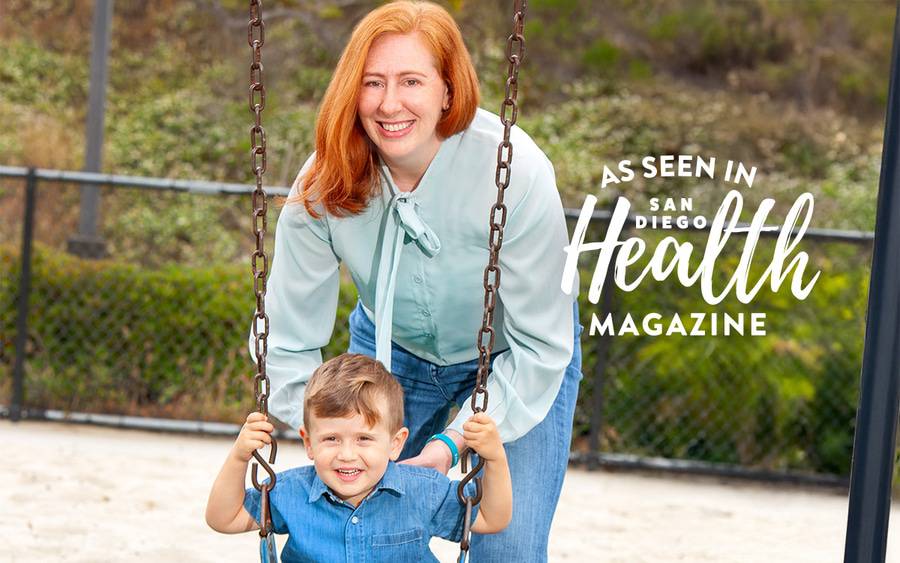ECMO Care at Scripps Saves Mother After Birth Emergency
Advanced life support helps Olivia Smoak survive rare complication

Advanced life support helps Olivia Smoak survive rare complication
Olivia Smoak has never been one to back down from a challenge. An outspoken native New Yorker, she worked as a nurse in New York City for four years before joining the Navy at age 30. During the next several years, she deployed to Puerto Rico on a hospital ship to assist in recovery efforts after Hurricane Maria, then to Texas to help with patient care during the COVID-19 pandemic.
She was living in Florida where her husband, Jon, a Navy helicopter pilot, was stationed when she learned what her next adventure would be: Olivia was pregnant with the couple’s first child.
From pregnancy to crisis: A rare childbirth emergency
Even when the couple received orders to relocate to San Diego and Olivia began working nights as an emergency department nurse at Naval Medical Center San Diego, all signs remained normal.
Then her blood pressure started to rise. At 39 weeks, doctors at the Naval hospital, where she was receiving prenatal care, induced labor. Forty hours later, Olivia began to feel short of breath and like someone was “sitting on my chest,” she says. Baby Theo was safely delivered and was taken to the hospital’s neonatal intensive care unit, but Olivia’s condition was worsening.
Doctors determined she was experiencing heart failure and an amniotic fluid embolism (AFE), a rare but life-threatening complication. AFE occurs when amniotic fluid enters the mother’s circulatory system, triggering a severe reaction. This can lead to heart and lung failure, including complications, such as cardiac arrest.
How ECMO saved Olivia’s life
Olivia was connected to an extracorporeal membrane oxygenation (ECMO) machine, a form of life support that takes over for a patient’s lungs and heart when those organs are failing. When a bed became available at Scripps Memorial Hospital La Jolla, she was transferred via Scripps’ ECMO-enabled ambulance. For the next 11 days, she received care that not only saved her life but permanently changed it.
When Olivia arrived at Scripps Memorial Hospital La Jolla, she was in multi-system organ failure, says Ayana BoydKing, DO, a pulmonologist and critical care physician at Scripps Clinic Anderson Medical Pavilion in La Jolla and one of the first doctors to treat her. She was taken to the intensive care unit (ICU) where she underwent multiple blood transfusions and was put on dialysis because her kidneys were failing.
Scripps’ ECMO capabilities were critical to her survival. “It helps us buy time while we find and treat the underlying condition,” Dr. BoydKing explains.
Sam Baradarian, MD, a cardiothoracic surgeon at Scripps Clinic with expertise in heart failure, also consulted on her case. He helped get Olivia off ECMO after five days. “As soon as she started getting better, we were all just ecstatic,” he recalls.
Heart of resiliency
When Olivia woke up after being sedated, her body still had plenty of healing to do. Despite the challenges, her care team’s determination — and her own perseverance — helped her push through.
“Olivia is amazing. She’s a warrior,” says Dr. BoydKing. “She never complained, and she was so incredibly grateful for all the work that had been done.”
Olivia says she was struck by the teamwork at Scripps, especially among the nurses. “I have never seen such morale in a hospital,” she says. “There was so much kindness and so much respect they had for each other.”
Turning survival into purpose: Olivia’s next chapter
After recovering, Olivia continued dialysis and physical therapy while processing the trauma of having an AFE. She stayed in the Navy for a few more years but ultimately pursued a new dream: earning a Doctor of Nursing Practice degree, with plans to focus her doctoral project on AFE.
She hopes to return to Scripps — not as a patient, but as a nurse on the “collaborative, compassionate, fantastic” team that helped save her life.

This content appeared in San Diego Health, a publication in partnership between Scripps and San Diego Magazine that celebrates the healthy spirit of San Diego.